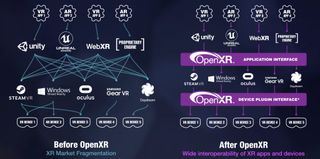SteamVR gets an open-source upgrade as Valve transitions to the OpenXR API
Valve's move comes at a time when Oculus is gaining the upper hand in market share.

What you need to know
- Valve will be ending OpenVR development in favor of the open-source OpenXR API.
- All 4,000+ OpenVR games on Steam will continue to work as normal, so no fear of losing access to your games.
- OpenXR makes developing for multiple headsets and platforms easier than OpenVR.
When SteamVR first launched some four years ago, it carried the standard for VR development through a development interface known as OpenVR. Despite the name, however, the OpenVR API wasn't actually open-source and, over the years, has received a bit of backlash from various members of the development and enthusiast communities. While SteamVR currently houses a library of over 4,000 OpenVR games, Valve is announcing that it will no longer be supporting OpenVR going forward and will move to the OpenXR platform, instead.
While OpenVR supported all major PC VR headsets, it did so at the expense of a more complicated ecosystem for developers to work with. OpenXR was announced exactly a year ago (almost to the day) and was designed by The Khronos Group to unify the VR world around a single API that developers can work with instead of having to develop for specific headsets. If The Khronos Group sounds familiar, that's because it is the same group behind Vulkan, the popular open-source API that developers have been working with for years to enable their games to work across platforms like PC, console, and mobile alike.

The diagram above, supplied by The Khronos Group, shows how OpenXR simplifies things for developers and will help lower friction in VR development. That's particularly important as we continue to see the rise of Oculus, especially with the success of the Oculus Quest, which now also supports OpenXR. The death of OpenVR began earlier this year when Unity pulled official support for the API, signaling that a huge change was about to begin. This move should help improve what's become quite a fragmented market.
So what does this mean for gamers? If nothing, it means that it'll continue to be easy to choose the VR headset you want without fear of losing out on important releases like Half-Life: Alyx. All of your existing SteamVR games (that have used OpenVR) will continue to work like normal and, going forward, we will continue to see games being made for VR headsets using popular engines like Unreal and Unity, which both officially support OpenXR. The latest Steam beta already has OpenXR support enabled, so if new experiences are released using the OpenXR API, you'll have access to them right away.
Thanks for the tip, Philippe!
All the games announced at the Upload VR Showcase Summer Edition 2020
Get the Windows Central Newsletter
All the latest news, reviews, and guides for Windows and Xbox diehards.
Nick started with DOS and NES and uses those fond memories of floppy disks and cartridges to fuel his opinions on modern tech. Whether it's VR, smart home gadgets, or something else that beeps and boops, he's been writing about it since 2011. Reach him on Twitter or Instagram @Gwanatu

